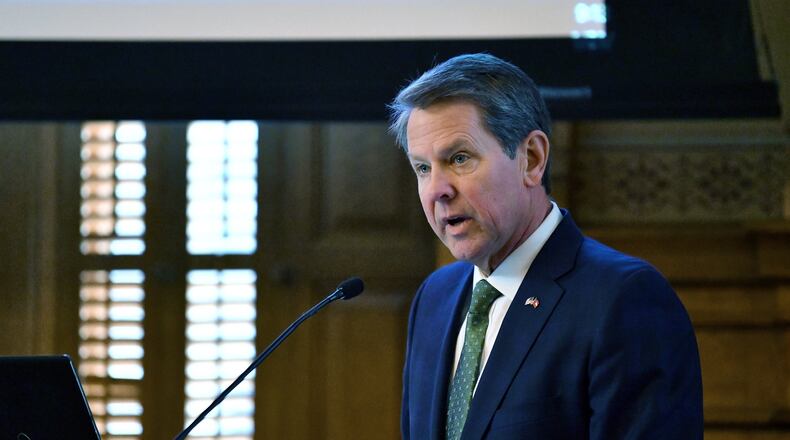Gov. Brian Kemp’s office on Wednesday released details of anti-gang legislation he’s supporting.
The Nicholas Sheffey Act, named for an 11-year-old Chamblee boy killed in a drive-by shooting, is largely intended to strengthen penalties faced by those convicted of gang activity, according to information obtained by The Atlanta Journal-Constitution. For defendants convicted of multiple crimes in a gang case, the bill would allow judges to sentence them to up to an additional 5-15 years in prison for each count, which could easily leave more convicted gang members facing the rest of their natural lives behind bars.
In murder cases involving gang activity, defendants would automatically be eligible for the death penalty. The death penalty can already be used in a wide range of cases that could include gang cases, though capital punishment is becoming less common in recent years as life without parole has become more common.
A companion bill would create a legal division of the GBI so that, when requested, the agency’s lawyers could serve as special prosecutors. That’s an apparent attempt to help rural or understaffed district attorney’s offices handle more gang cases, which are notoriously time-consuming and tricky.
The bills, which must pass the state House and Senate, are part of the Kemp administration's vowed crackdown on gang activity in Georgia. In Kemp's budget proposal this year, the governor is asking legislators to approve spending nearly $2 million for seven new positions on the GBI's Gang Task Force and resources to set up the statewide gang database.
"My focus is on fulfilling my campaign promise to go after street gangs," Kemp said recently. "We still have a lot of work to do there, so that's my priority."
News of the bills, expected to be officially announced Thursday, comes days after Kemp-appointed GBI Director Vic Reynolds and other law enforcement personnel spoke told lawmakers about the state's gang issues. Reynolds said local law enforcement agencies all over the state have told the GBI that gangs are the most pressing challenge they face — "from North Georgia to South Georgia, from east Georgia to west Georgia."
» RELATED: Gang 'crisis' in Georgia? It's real, safety officials tell lawmakers
The director acknowledged it’s difficult to say how many gang members there are in Georgia. But he cited a 2018 study by the Georgia Gang Investigators Association, which estimated the state had 71,000 gang members and 1,500 gangs. He also said federal data on gangs showed in 2011 that, nationally, gang membership had been on the rise since 2005.
The proposed bills would give new and broad power to prosecutors to fight gangs, even allowing them to prosecute gang activity that didn’t happen in their jurisdiction. For example, if a gang member was charged in Forsyth County, prosecutors would also able to charge them with gang crimes other counties.
Some who were advocates of former Gov. Nathan Deal’s prison reforms worry Kemp’s gang initiatives threaten what they view as improvements that have reduced the states’ prison population and encouraged diversionary programs.
“We know these reforms work,” said Jason Pye of FreedomWorks, a libertarian-leaning advocacy group. “Why would you change the approach and go back to what we know doesn’t work?”
About the Author
The Latest
Featured



